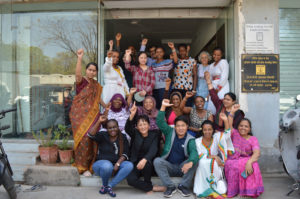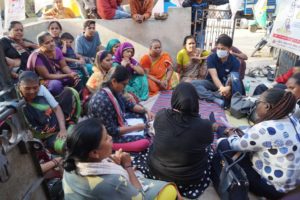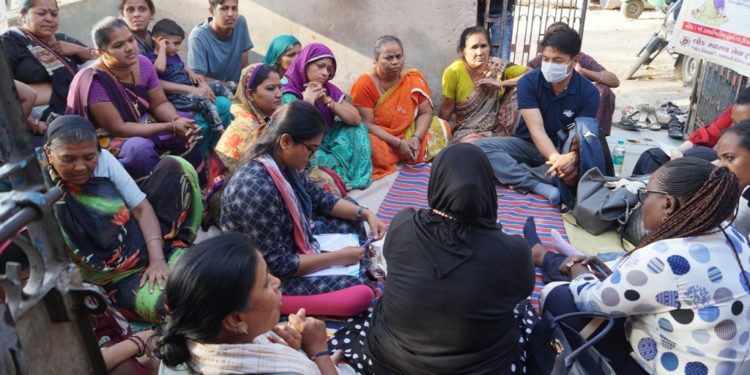AHMEDABAD, MARCH 5
Self Employed Women’s Association (SEWA) organized a 15-day training programme on Women’s Economic Empowerment for 15 participants from four countries – Ethiopia, Rwanda, Tanzania, and Bhutan representing both government and civil society organization. Father of the Nation Mahatma Gandhi replicated his South Africa experience in India to get freedom. Similarly, the participants are urged to replicate their SEWA experience in their respective countries for the economic freedom of women, said a top official of SEWA here on Wednesday.

According to Indian Academy for Self Employed Women SEWA Academy director Namrata Bali, “SEWA’s sister organization the Lok Swatiya SEWA Trust, in partnership with the Global Development Centre (GDC) has organized this first-ever GDC Fellowship Programme on Women’s Economic Empowerment. The objectives of this training programme are to promote South-South cooperation and mutual learning on how to achieve women’s economic empowerment sustainably so that the entire family is self-reliant. During this forrrtnight long training, exposure-dialogue programme on women at the grassroots level into their sustainable organisation, social security from the worker’s perspective, integrated approach off SEWA for full employment and self-reliance were covered. Further, SEWA offers online training to its members in Gujarati and English.”


Shrikant Kumar, project director, GDC Fellowship training programme, said, “The training also included details of Government of India’s programmes – Ayushman Bharat and the National Rural Livelihoods Mission, work at the grassroots level and the macro level thinking behind these. The participants saw and learned how to strengthen existing membership-based organizations (MBOs) through an integrated approach of work and income security, food security and social security. Along with extensive field visits, they got the chance to interact and exchanged ideas and strategies with health workers, co-operative leaders, organizers, community leaders and different government officials in Ahmedabad.”
After the 10-day session in Ahmedabad, the 5-day second session will be held in New Delhi. The participants will interact and hold discussions with senior officials from the ministry of rural development, the ministry of health and family welfare and the Niti Aayog in Delhi.
Mirai Chatterjee, Managing Trustee, Lok Swasthya SEWA Trust (LSST) and Director, SEWA Social Security team explained the importance of organizing to achieve work security and social security which women call two sides of the same coin. She also emphasized on building grassroots women’s leadership and developing building financially viable MBOs for women’s economic empowerment and self-reliance.
Kezang Dolkar Dorji, Interim Executive Director, SAARC Business Association of Home-Based Workers (SABAH Bhutan), said , “This training programme is a fantastic opportunity for us to understand the concepts of social security and livelihood in holistic way. It’s indeed great to see that how in more than 47 years of existence, SEWA helped informal sector women workers to come out of poverty. The training provided us more insights on how we can help the Home Based Workers (HBWs) in their countries.”
Roman Worku Mekuria, Cooperative Union Manager, Organization for Women in Self Employment (WISE), Ethiopia), shares, “I have had some amazing learning during this training program. I joined this program to understand about how to empower poor women socially and economically. In our country we do not yet have much interaction with the government and we now understand that only if we work together will we be able to bring change. We hope to work more now with our government. I loved the systematic and integrated approach of SEWA for women’s economic empowerment.”
Aimé Marie Ange Tumukunde from Ministry of Trade and industry, Rwanda shares, “ By interacting with the participants of many other countries and SEWA sisters, I got some wonderful insights. It’s amazing to see how SEWA is working in collaboration with the local government institutions for implementation of social security programs. This provides me deep understanding on how the Government of Rwanda can also implement existing programmes in much better way and can design some new ones. I hope that in future a strong partnership among the Government of Rwanda, the Government of India and SEWA will develop and it will lead to valuable exchange of knowledge and cooperation for helping poor-women workers in Rwanda.”
Hafidhu Said Salum Hadhry from the Ministry of Labour, Empowerment, Elders, Women and Children, Government of Tanzania shares, “I understood the co-operative model and benefits it gets from the SEWA Federation. I also learned about social security and how SEWA collaborated with the government and others to fulfil its objective of empowering women”..












